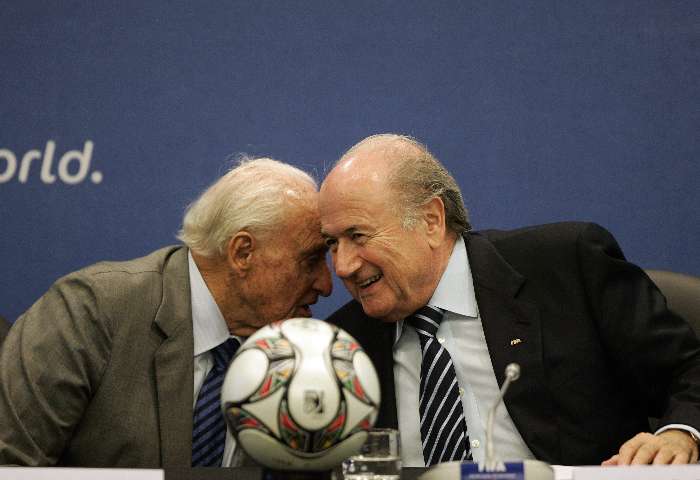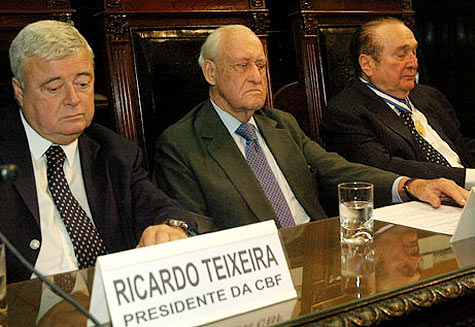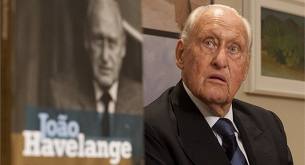By Duncan Mackay
December 4 – Joao Havelange, the former controversial President of FIFA, has resigned as a member of the International Olympic Committee (IOC) to avoid being expelled from the organisation he has served for nearly 50 years.
The 95-year-old Brazilian, a member of the IOC since 1963, making him the longest serving member of the organisation, submitted his resignation letter last Thursday (December 1) citing health reasons, Associated Press have reported.
Havelange faced suspension from the IOC over his part in a bribery scandal stemming from his time as the head of football’s world governing body.
FIFA had refused to investigate the claims but the IOC requested the information from BBC programme Panorama shortly after the programme was broadcast in November 2010.
The IOC Ethics Commission began an inquiry into allegations that Havelange received $1 million (£618,000) from ISL, which owned World Cup television rights and collapsed with debts of $300 million (£192 million) in 2001.
A two-year suspension, or even possible expulsion, for Havelange was expected to be considered at the IOC Executive Board meeting in Lausanne next Thursday (December 8).
With his resignation, the ethics case against him is expected to be dropped, as the IOC rules stipulate.
Havelange was succeeded by Sepp Blatter (pictured below with his predecessor) in 1998 after 24 years as the head of FIFA.

Havelange, who represented Brazil in swimming at the 1936 Olympics in Berlin and water polo at the 1952 Games in Helsinki, is a former lawyer who rose to the top in FIFA.
He was elected as President in 1974 and held the post until Blatter, his chosen successor and who had worked closely with him as FIFA’s general secretary, succeeded him.
Havelange has continued to play an active role within the IOC and at its Session in Copenhagen in 2009 was a leading member of the delegation that helped Rio de Janeiro become the first South American city to be awarded the Olympics and Paralympics, beating rivals Chicago, Madrid and Tokyo.
Havelange’s role was praised by Carlos Nuzman (pictured below), the President of Rio’s successful bid, after he had brought applause from the IOC members after he invited them to Rio to celebrate his hundredth birthday, which he is due to celebrate in May 2016.

But, following the revelation that he was under investigation, Havelange failed to turn up for the last IOC Session in Durban in July, where Pyeongchang were awarded the 2018 Winter Olympics and Paralympics.
Two other prominent IOC members, International Association of Athletics Federations (IAAF) President Lamine Diack and Issa Hayatou, President of the Confederation of African Football (CAF), are also under investigation and are due to have their cases discussed at this week’s Executive Board meeting but face much lesser penalties, it is believed.
Ricardo Teixeira, Havelange’s former son-in-law and head of Brazil’s 2014 World Cup Organising Committee, was also identified by Panorama as having received payments.
Teixeira is not an IOC member but his position is set to come under even greater scrutiny following this latest twist, especially as Blatter announced at the last FIFA Executive Committee meeting in Zurich that he planned to reopen an investigation into the ISL case.

Brazilian authorities are seeking the Swiss documents to investigate possible money laundering.
Havelange is the first member to resign from the IOC in connection to an ethics case since former IOC vice-president Kim Un-yong of South Korea stepped down in 2005 rather than face expulsion.
Ruben Acosta, the former President of the international volleyball federation FIVB, resigned from the IOC in 2004, two days before the Ethics Commission was due to recommend his possible expulsion for alleged misuse of Olympic funds.
Four IOC members resigned in 1999 after being implicated in the Salt Lake City bid scandal while six others were expelled for accepting cash, gifts, scholarships and other improper benefits during Salt Lake’s winning bid for the 2002 Winter Games.
Bulgarian member Ivan Slavkov was expelled in 2005 for alleged corruption after he was also exposed by Panorama, who claimed that he was prepared to sell his vote to London’s bid for the 2012 Olympics and Paralympics,
Indonesia’s Mohamad “Bob” Hasan, who was jailed in a scam involving a forest-mapping project in the 1990s, was kicked out in 2004.
Contact the writer of this story at zib.l1744078640labto1744078640ofdlr1744078640owedi1744078640sni@y1744078640akcam1744078640.nacn1744078640ud1744078640

